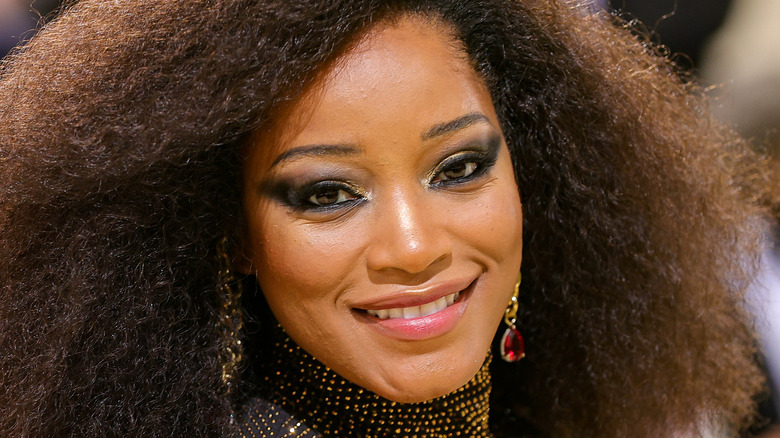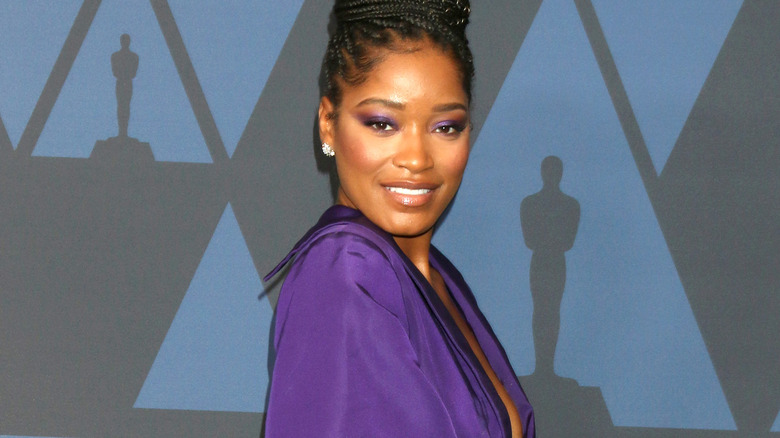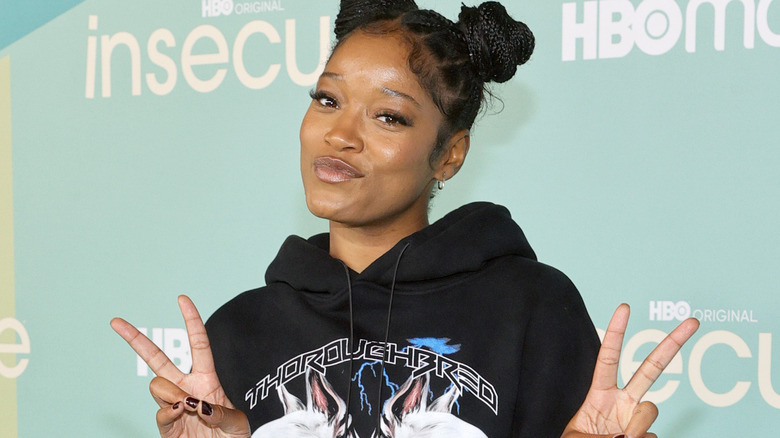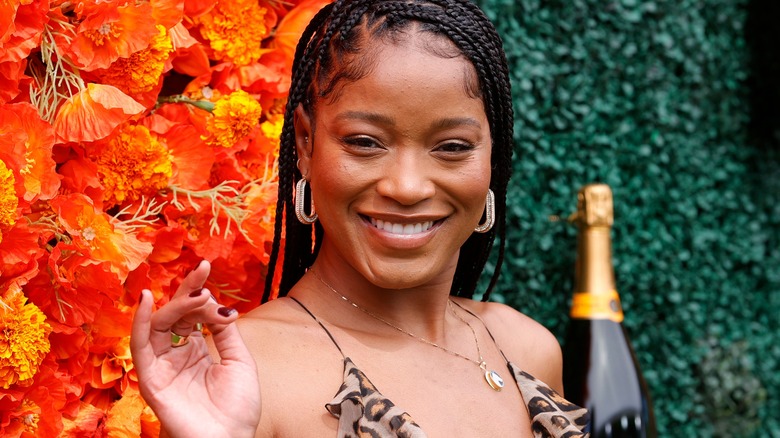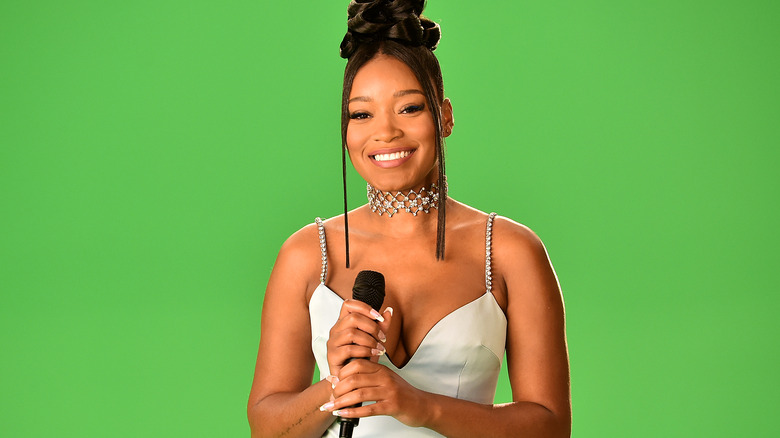Keke Palmer On Her Darker Role, Time Periods, And Preparing For Alice - Exclusive Interview
Sometimes, a star can simply do it all. They may put in a lot of work, but their efforts appear, well, effortless. Such is undoubtedly the case for Keke Palmer, who can act, sing, host, and more, flawlessly. Palmer rose to fame as the child star of Nickelodeon's "True Jackson, VP" and has since become known for 2018's "Pimp" and 2019's "Hustlers," as well as her music career. Now, Palmer has two big films hitting cinemas across the world this year: "Alice" and Jordan Peele's next great hit, "Nope."
"Alice" hits theaters on March 18 and follows Palmer in the titular role. Unfortunately based on a true story, Alice is a slave living on an Antebellum-era plantation. However, she escapes one night only to learn that the year is actually 1973, and the plantation owner has kept slaves nearly a full century after slavery was abolished. In fact, she learns the truth when she breaks through the forest surrounding the property and encounters a highway. It's here that she nearly dies via truck collision. Instead, she's rescued, and she learns the despicable truth about her circumstances.
We at The List recently sat down to talk with Palmer about her work on "Alice," and she told us not only what fans can expect to see in the film, but also, how she prepared for it, what her personal frames of reference are for the '70s, how she switched gears to take on a darker role, and more.
Keke Palmer on approaching a darker film than usual
What can you generally tell us and tease about "Alice"?
"Alice" is a movie about a character named Alice, who we first discover on a plantation, but realize after she escapes that she's actually existing in the 1970s. It's a movie about [how] knowledge is power, and freedom is something that you personally have to activate on your own, despite your circumstances. It's really about the history that has not been very wildly known, which is that slavery was continued after its abolishment.
You've had this long, extensive career already, which is amazing to see. Have any of your past roles helped prepare you for this one, and were there any particular roles that really helped prepare you?
My experience as an actress has prepared me for a role like this. Experiencing character study and different worlds and fish out of water and playing different archetypes have allowed me to have the different elements in my arsenal that I could put into a character like Alice. In terms of how deep the character is, a movie I did called "Pimp" really prepared me to be emotionally shot out of my comfort zone, which gave me the confidence and the courage to be able to play a character like Alice.
You've done a lot of comedy and drama work. This film is tonally and thematically, I would say, a lot darker than a lot of your other work. So I was wondering how you approached switching gears to do something darker, and if maybe that provided any obstacles for you?
[I] switch[ed] gears like I switch gears at anything. I think the reason why I make sure that I do so many different things is so that I have a balance and that I have enough energy, especially when it comes to doing a darker role. I'm very careful about heavier roles because they mentally do take a toll. I try to make sure that I have a bunch of other things happening either before or after that can counteract whatever I emotionally went through when getting into that character.
It's a preparation thing. It's also, while doing the film, making sure that I'm doing certain practices that allow me to also stay connected to myself, whether it be working out or doing yoga or meditating or hanging out with friends. I always try to balance what I'm experiencing with the deep characters so that I don't get lost in it.
On whether she researched the true event to prepare for her role
In that realm, this film is unfortunately based on history and on real-life events. In that way, did you do any special research or anything to help prepare for the role?
None outside of getting into the Black exploitation films and era. I know of that era, or I knew of that era before for the film, but it also was good to dive back into certain things and watch certain movies to ... The sentiment, even though this movie is not a Black exploitation movie, it does pay homage in a lot of ways. More importantly, the film, the poetry of what that symbolizes is giving Alice an opportunity to exist in the same way that Black exploitation films did, which was providing a sense of hope, inspiration, and allowing for justice to be seen even in an artistic fashion, if it's not currently being seen enough around you in society.
It's funny you say that, because "Alice" appears to be part of this bigger movement that's happening in film where Black creators are really getting to have a voice and tell authentic stories. I think of Jordan Peele and I think of, recently, "Candyman" and all of this. What does that mean to you now be really a part of that with "Alice"?
It means so much. As artists, we're always trying to say something. You always want to say something, even if it's "Hey, be silly" ... whatever it is, there's always something you're trying to say. I'm always trying to say that we deserve to be heard. We deserve to exist, whether it be being a woman, whether it be being a creative, whether it be being a millennial, whether it be being a Black person. I'm always trying to say something that is going to help and push a conversation that is necessary forward, even with "Pimp" and LGBTQ+, and being able to save space for one another. I know with "Alice," it's no different. It's an opportunity to say something and I'm glad that I got to say it with Krystin [Ver Linden] and Common and everyone who was in the film.
On bringing Alice to life between two time periods
The film, as you pointed out, is set in the '70s, and a lot of your previous work has been set [in] modern day. How [did you get] into that '70s mindset, or what are your personal points of reference for that time period that maybe helped you?
I watched a lot of old movies with my parents growing up. I'm very alt, I'm also very much inspired by my father, [who is] that cool, old brother, so a lot of the feelings and the vibe of that era, I experienced through the knowledge of my parents and their pasts, in films and music and things of that sort. I took that, but also maintained what was relative to Alice, because that's the thing, right? I couldn't come out there and say, "You jive turkey motherf****r," because she didn't know that. Alice would not know, even though I really would've loved to do that. The reality is that the craziest word that Alice probably knows is "hell" or "damn," because she could read that in the Bible.
She didn't have that vocabulary. I was able to do '70s to a certain extent, but I was really meant to do, you know how Alice existed on the plantation and within the framework of the '70s. It was playing that balance to actually do what would have been comparable to what Alice would've been able to get in on and be able to adapt to.
That's really interesting. I guess I hadn't thought about that time difference. It's almost like time travel in a way.
If we were doing a straight Black exploitation film, then it would be like, "I'm a bad mother." We were actually trying to give a more grounded representation of what that would be for today. I had to very much downplay exactly what would be the 1970s vibe and actually sub it in for more, what would be Alice's vibe and vocabulary from being on the plantation all of her life.
On working with Common and what's next for her
You definitely brought her to life super well, which was amazing. We also love the cast in the movie. What was it like for you to work with Common on this movie?
Oh man, it was so amazing. I love Common. He's such a good person. He's so much fun to work with. With such heavy subject matter, it was great having him by my side because he's such a great support to women and also Black women. His admiration of what that experience could be as a Black man is a beautiful thing to be around.
I love to hear that. What is next for you after "Alice"?
[A] bunch of different things, from TV to film, to hosting, and definitely, most importantly for me, producing and writing and directing and being able to take it from being on screen, to being behind the screen.
"Alice" premieres in select theaters on March 18.
